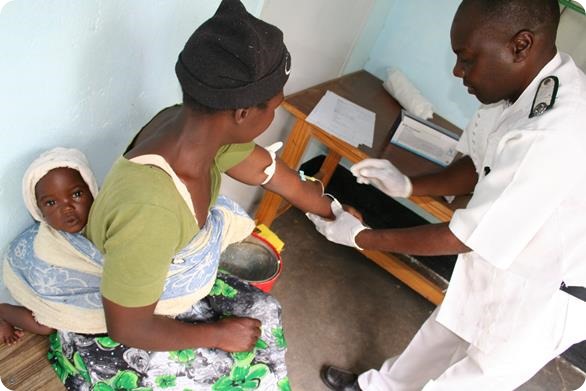Cambridge Consultants is working with Médecins Sans Frontières (MSF) to help support moves to expand access to vital diagnostic tests, which paves the way for better treatment of HIV in some of the world’s least-developed countries.

A MSF nurse takes a sample of blood from a woman living with HIV in Murambinda, eastern Zimbabwe, for monitoring the health of her immune system, and the effectiveness of her anti-retroviral treatment. This monitoring of blood samples is done every 3-6 months. Cambridge Consultants today announced that it working with MSF to widen access to HIV viral load tests in developing countries. Photo credit: (c) Kenneth Tong/MSF.
The product development and technology consulting firm is helping MSF’s efforts to widen access to HIV viral load tests by exploring the relative costs of the technologies underpinning a range of viral load assays. These tests are designed for HIV-infected patients undergoing antiretroviral therapy and measure the number of HIV viral particles in patients’ blood.
Viral load testing is the gold standard for HIV treatment monitoring, as it can accurately and quickly detect whether antiretroviral treatment is working. Regular monitoring ensures treatment continues to be effective and patients are adhering to their therapy regime. The World Health Organization strongly recommends the use of regular viral load monitoring in developing countries.
James Blakemore, senior consultant at Cambridge Consultants, said: “Price and complexity have so far hindered the rollout of these life-saving tests in developing countries. Our work with MSF allows us to share our understanding of the relative costs of assay technologies employed in both central laboratories and point-of-care environments.”
Teri Roberts, diagnostics adviser at MSF, said: “Viral load testing is the best way to ensure treatments are working for patients. It enables timely switching to a more effective drug regimen quickly and accurately before further drug resistance mutations accumulate and reduce the efficacy of second and third-line regimens. The test also helps keep people on more affordable drugs for as long as possible, as targeted and enhanced adherence support – triggered by a detectable viral load – may help keep patients on existing regimens. Working with Cambridge Consultants to analyze key technology options is allowing us to settle on a fair price for a high-quality viral load test.”
Cambridge Consultants is assessing the relative cost per HIV viral load test based on different technologies – analyzing costs from reagents, packaging and labeling, as well as manufacturing and intellectual property considerations.